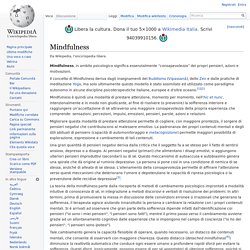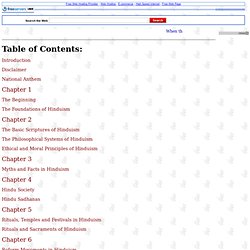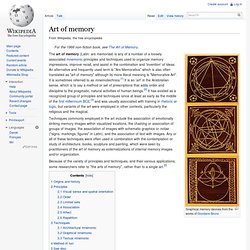

Stoicism. Theories of Emotions. It's all in the mind. Critical Thinking. Critical Thinking. Brain Pickings. THE MATRIX. Epigenetics and Heritable Damage. Perception. Ken Wilber. iPad Tips & Tricks. Spirit. THE BRAIN. Psychology. Mindfulness. Da Wikipedia, l'enciclopedia libera.

Mindfulness, in ambito psicologico significa essenzialmente “consapevolezza” dei propri pensieri, azioni e motivazioni. Il concetto di Mindfulness deriva dagli insegnamenti del Buddismo (Vipassanā), dello Zen e dalle pratiche di meditazione Yoga, ma solo ultimamente questo modello è stato assimilato ed utilizzato come paradigma autonomo in alcune discipline psicoterapeutiche italiane, europee e d'oltre oceano.[1][2] Mindfulness è quindi una modalità di prestare attenzione, momento per momento, nell'hic et nunc, intenzionalmente e in modo non giudicante, al fine di risolvere (o prevenire) la sofferenza interiore e raggiungere un’accettazione di sé attraverso una maggiore consapevolezza della propria esperienza che comprende: sensazioni, percezioni, impulsi, emozioni, pensieri, parole, azioni e relazioni.
Una gran quantità di pensieri negativi deriva dalla critica che il soggetto fa a se stesso per il fatto di sentirsi ansioso, depresso o a disagio. Mind Map and Concept Map Creating Tools & Tips. Evolution Of Mind. Exploring the Legacy of the David Bohm and Jiddu Krishnamurti Relationship. David Bohm. A Brief Introduction to Hinduism. Would you like to make this site your homepage?

It's fast and easy... Yes, Please make this my home page! Don't show this to me again. Table of Contents: Introduction Disclaimer National Anthem Chapter 1 The Beginning The Foundations of Hinduism Chapter 2 The Basic Scriptures of Hinduism The Philosophical Systems of Hinduism Ethical and Moral Principles of Hinduism Chapter 3 Myths and Facts in Hinduism Chapter 4 Hindu Society Hindu Sadhanas Chapter 5 Rituals, Temples and Festivals in Hinduism Rituals and Sacraments of Hinduism Chapter 6 Reform Movements in Hinduism Chapter 7 Popularized Notions in Hinduism Literature Central to the Indian Culture Ramayana Mahabharata Appendices The Cycle of Life Hinduism as per History Hindu Scriptures World Religions Gods of Hinduism Indian National Anthem Jana-gana-mana-adhinayaka, jaya he Bharata-bhagya-vidhata Punjab-sindhu-gujarata-maratha-
18 Great Reads That Changed My Life. It’s fairly easy to find a well written book or online article.

But it’s not always easy to find one with genuine value that you connect with. That’s because, these days, books and online articles are a dime a dozen. There are literally thousands of them written on the same topic every year. So deciphering the ‘good’ from the ‘great’ can prove to be quite a challenge. But if you look hard enough, in the right places, you’ll find a few gems containing life-altering advice that can be immediately implemented and used as an instrument for self-improvement. For this reason, I’ve compiled the following list of books and online articles containing value so profound that each of them literally changed my life. I therefore extend my gratitude to the authors and pass them along to you with the simple hope that they will provide value to you as well.
Happy reading… The Power of Now by Eckhart Tolle – Tolle’s message is clear: living in the now is the truest path to happiness and enlightenment. Related. Art of memory. The art of memory (Latin: ars memoriae) is any of a number of a loosely associated mnemonic principles and techniques used to organize memory impressions, improve recall, and assist in the combination and 'invention' of ideas.

An alternative and frequently used term is "Ars Memorativa" which is also often translated as "art of memory" although its more literal meaning is "Memorative Art". It is sometimes referred to as mnemotechnics.[1] It is an 'art' in the Aristotelian sense, which is to say a method or set of prescriptions that adds order and discipline to the pragmatic, natural activities of human beings.[2] It has existed as a recognized group of principles and techniques since at least as early as the middle of the first millennium BCE,[3] and was usually associated with training in rhetoric or logic, but variants of the art were employed in other contexts, particularly the religious and the magical. Origins and history[edit] One of Giordano Bruno's simpler pieces Principles[edit]
Salute. Buddhism. Animal cognition. Pearltrees videos. Getting started.